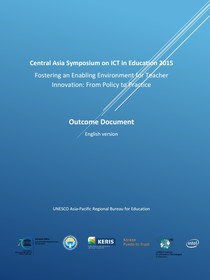ICT in Education Policy
Project Overview
In order to make successful use of ICT in enhancing the reach and quality of teaching and learning, policy makers need to be aware how ICT can be of best value in their country's education system, and need to develop a supportive policy environment and framework at the national level for the effective integration of ICT into their education systems. A recent UNESCO publication “Transforming Education: The Power of ICT Policies” illustrates that envisioning clear policy goals and translating them into appropriate implementation strategies and action plans is the key factor in achieving the systematic transformation of education through ICT.
The ICT in Education Programme at UNESCO Bangkok assists Member States in the development of relevant ICT in Education policies and strategies, through conducting policy development workshops, providing a comprehensive policy review, and facilitating regional policy dialogues .
(1) Policy Development Workshops
The UNESCO ICT in Education Programme provides a series of capacity building workshops to assist the Member States who wish to develop an ICT in education master plan or policy in a holistic manner. It aims to promote appropriate policy models and strategies for the integration of ICT into education in the Asia-Pacific region, with special emphasis on developing policies which utilize ICT to remove barriers to participation in education and enhance the quality of education.
The effective ICT in Education policy should closely aligned with national education vision and policy, specify implementation strategies and resource mobilization plans for a longer-term (e.g. a 5-year plan). For an overview of the ICT in Education Master Plan development workshop, please click here.
The overall objectives of the workshops include:
- Raise the awareness of policy decision makers of benefits and risks in using ICT in education in order to help them harness the potential of ICT to achieve their education goals;
- Strengthen the capacity of policy decision makers to develop, implement and monitor effective ICT in Education policies and plans; and
- Estimate and project the cost implications for the selected ICT provision for educational institutions.
(2) Policy Review
The UNESCO Bangkok ICT in Education programme supports the Member States who have already developed and implemented their ICT in Education Master Plan or policy by systematically reviewing the policy documents and reports against the national educational goals. This review exercise, carried out by UNESCO and international experts, provides an opportunity for the concerned Member State to benchmark their master plan and policies with those of other countries in the similar contexts, broaden up the perspectives to align with the national education sector plan, look closely into strengths and weakness, and revisit the implementation strategies.
The key questions for the ICT in education policy review are following:
· Does the country have a national policy or plan that integrates ICT into the national education system? Is it time-bound, costed and reflected in the government budget? Has it been discussed with and endorsed by the other ministries concerned?
· Is there a dedicated agency for technology policies in education? If so, please describe its main responsibilities, activities and connections with the corresponding ministries.
· Please provide basic statistical data about access to technology at home and in the classroom by both students and teachers. Specify types of devices, ratios of equipment to teachers and to students and the level of bandwidth penetration (both at home and in schools). To what extent the school infrastructure is complied with the national policy for ICT in education? Are there differences among regions? (to what extent the government-led e-contents are being used?)
· Is there any digital contents supplied by government? Any special agencies that supply digital contents closely aligned with the national curriculum?
· What are the skills that teachers have to develop during their initial training to use technology in the classroom for pedagogical purposes? Are these skills compulsory? How are they assessed? Is there any certification for this?
· What kinds of in-service training and continuous professional development activities are available to teachers who wish to use technology effectively in improving their teaching and learning? Are these activities ad hoc or part of the government strategy? How are they assessed? What are the implications of the professional development (compulsory for maintaining teacher license, promotion, salary increment, etc.)?
· What are the main challenges that the country face in integrating ICT in school teaching and learning? What are the policy responses to address these challenges?
(3) Policy Forum
The UNESCO Bangkok ICT in Education programme organizes regional and sub-regional policy fora to cross-fertilize Member States’ knowledge, experiences and lessons learned in planning and implementing innovative initiatives in ICT for education across the region and beyond. It has created a series of platforms, such as the annual Asia Pacific Ministerial Forum on ICT in Education since 2010, the Central Asia Symposium on ICT in Education since 2011. For the details of each forum, including programme, presentations and outcome documents, please visit Events.
Contact Information
Ms. Jonghwi Park
Programme Specialist
UNESCO Bangkok APEID/ICT in Education
Tel: +66 2 3910577 Ext. 225
j.park@unesco.org


